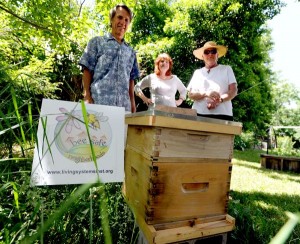19
Jun
First Colorado “Bee Safe” Neighborhood Established
(Beyond Pesticides, June 18, 2014) Just in time for Pollinator Week, the Melody-Catalpa neighborhood of Boulder has become the first “bee-safe” locality in Colorado that has pledged to not use neonicotinoids and other systemic pesticides in the community, in an effort to protect bees and other pollinators, and provide safe forage and habitat.
 Melody-Catalpa joins other small communities across the country in taking a stand against bee decline by committing to not use pesticides toxic to bees and other pollinators. The small community north of Boulder signed a pledge not to use neonicotinoids and similar systemic pesticides, and is buzzing with excitement over earning the distinction. This past spring, the City of Eugene, Oregon became the first community in the nation to specifically ban from city property the use of neonicotinoid pesticides, citing recent research demonstrating a link between pesticides that contain neonicotinoids and the loss of plant pollinators, including honey bees, native bees, butterflies, moths, and other beneficial insects.
Melody-Catalpa joins other small communities across the country in taking a stand against bee decline by committing to not use pesticides toxic to bees and other pollinators. The small community north of Boulder signed a pledge not to use neonicotinoids and similar systemic pesticides, and is buzzing with excitement over earning the distinction. This past spring, the City of Eugene, Oregon became the first community in the nation to specifically ban from city property the use of neonicotinoid pesticides, citing recent research demonstrating a link between pesticides that contain neonicotinoids and the loss of plant pollinators, including honey bees, native bees, butterflies, moths, and other beneficial insects.
Melody-Catalpa’s grassroots action began earlier this year when three neighborhood residents banded together to sign on about 20 volunteers to go door to door to get more than half of the area’s 389 households to sign a pledge not to use the highly neurotoxic chemicals the science is showing is contributing to declines reported in global bee populations. Residents who signed the pledge were awarded “bee safe” flags, signifying their commitment to plant in their front lawns. For more information on getting your community to pledge to be neonicotinoid-free, contact Beyond Pesticides.
The organization certifying Melody-Catalpa’s status as the first neighborhood in Colorado to earn the “bee-safe” label is the Living Systems Institute of Golden, which promotes sustainable ecosystems and zero waste. David Braden, founder and executive director of the Living Systems Institute, confirmed that Melody-Catalpa is “the first one to provide documentation to us of at least 75 contiguous homes agreeing not to use systemic poisons,” 75 being the minimum number to qualify for the institute’s bee-safe designation. Explaining the impetus for encouraging more communities to make such a commitment, Mr. Braden said, “If we poison all of our pollinators, then there’s a problem for us as a species surviving on the planet.”
The decision by Melody-Catalpa to pursue ”˜bee-safe’ designation is applauded by Rella Abernathy, integrated pest management coordinator for the city of Boulder.”We think it’s a great idea,” Ms. Abernathy said. “The city always encourages residents to reduce or decrease their use of pesticides. We’re supportive of it, and we would like to see more and more bee-safe neighborhoods in the city.” Ms. Abernathy said the city has not used pesticides on any of its managed turf for 12 years, does not apply it to its landscape plants, and that the only neonicotinoid on the list of approved insecticides for use by the city is imidacloprid, for targeted injection in trees by its forestry department. However, the city recently banned its use for treatment of emerald ash borer management, and imidacloprid is not now in use at all, according to Ms. Abernathy.
Neonicotinoids, like imidacloprid, clothianidin, thiamethoxam, acetamiprid, and dinotefuran, are widely used as a seed coating on agricultural crops, and in home and garden products applied to flowering plants and vegetables. Studies have found that bees are exposed to neonicotinoid pesticides through pollen and nectar, as well as via contaminated soil, dust, and water. They have also been shown to impair bees’ ability to learn, to find their way back to the hive, to collect food, to produce new queens, and to maintain a healthy immune system. Most recently, a Harvard School of Public Health study, published in the Bulletin of Insectology, shows two widely used neonicotinoids appear to significantly harm honey bee colonies over the winter, especially during colder winters. Read the report No longer a Big Mystery.
With one in three bites of food reliant on pollinators, it is imperative that local action be taken to protect bees and other pollinators in light of federal inaction. In fact, a recent study out of the University of California, Berkeley, reports that not only do pollinators help increase crop yields, but they may be even more important than fertilizers to our agricultural economy.
This week, Pollinator Week, Beyond Pesticides is doing all we can to BEE Protective of honey bees and other wild pollinators, and we want to help elevate your voice, and provide you with the tools to make real change in your community that will help save the bees.
Catch the buzz this Pollinator Week, June 16-22, 2014, to celebrate and protect these beneficial creatures with BEE Protective!
- Use our model resolution to transform your community and raise awareness about pollinator health.
- Join us in asking Lowe’s and Home Depot and other leading garden centers to take action and stop the sale of neonicotinoids and plants treated with these chemicals.
- Tell your member of Congress to support the Save America’s Pollinators Act.
- Sign the Pesticide Free Zone Declaration and pledge to maintain your yard, park, garden or other green space as organically-managed and pollinator friendly
Source and Photo Courtesy: Daily Camera http://www.dailycamera.com/news/boulder/ci_25960458/boulder-neighborhood-states-first-be-declared-bee-safe
All unattributed positions and opinions in this piece are those of Beyond Pesticides.










